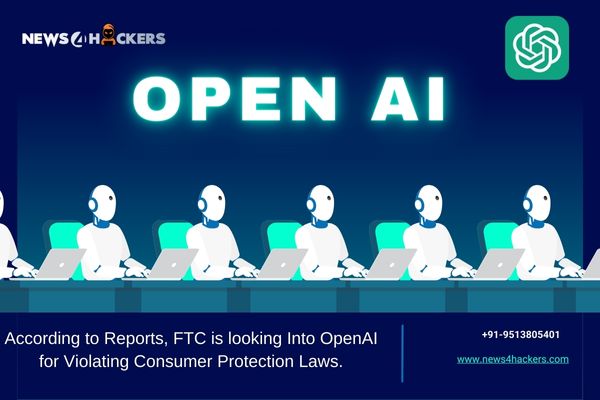According to Reports, FTC is looking Into OpenAI for Violating Consumer Protection Laws.

FTC is looking Into OpenAI for Violating Consumer Protection Laws.
Since the US Federal Trade Commission has requested specific justifications from OpenAI regarding its business procedures, the company is apparently subject to additional legal scrutiny.
According to reports, the US Federal Trade Commission is looking into OpenAI, the company behind ChatGPT, for possible violations of consumer protection laws pertaining to data privacy and deceptive assertions regarding third parties.
According to allegations that appeared on Thursday, the FTC has officially asked OpenAI for a variety of data, including information on how the firm distributes its products, how it finds and fixes systemic flaws, how it manages user data, and more. A 20-page paperwork, known as a civil investigative demand, or CID, that was allegedly the FTC’s request for information, was published by The Washington Post. The CID includes 14 requests for documents in relation to the 49 questions that OpenAI must respond to on its operations.
Although the legislative procedure typically moves much more slowly than the rate of change in the technology industry, the FTC has been the government agency that has been most active in this type of consumer protection action against the sector.
The CEO of OpenAI, Sam Altman, responded to the reports on Twitter while the FTC declined to comment.
The FTC’s request started with a leak, which is quite sad because it undermines trust. Having said that, we are quite certain that the technology we use is secure as well as consumer-friendly, and we always adhere to the law. We will collaborate with the FTC without a doubt, Altman stated. “We spent more than six months improving GPT-4 after completing the first training, building it on the foundation of years of security study. We safeguard user privacy and build our systems to learn about the whole world, not just specific people.
Regulating how OpenAI functions.
According to a Wall Street Journal story, FTC Chairperson Lina Khan stated to the House Judiciary Committee on Thursday that her organization is concerned about consumer-facing generative AI apps like OpenAI’sChatGPT having “no checks” on the data they get from users.
It’s tough to overstate the influence of artificial intelligence (AI) that generates on different businesses, experts agree. Many of the issues are typical of new technologies that swiftly enter the market without an established regulatory structure, according to Ryan O’Leary, research director at IDC.
When you initially started using ChatGPT, he continued, “There really weren’t any terms and conditions that were clearly in your face and easy to understand that explained, once you’ve put something into ChatGPT, where it was going.” They don’t understand how it knows everything. Thus the way the average public interacts with it is, “Oh, this is a machine that can tell you everything.”
It’s evocative, O’Leary continued, of Facebook’s explosive expansion when it first started to take off. Users at the time didn’t completely comprehend how their data was being used, which had major repercussions.
After Cambridge Analytica, the government is “much more careful and attempting to avert incorrect adoption,” the man claimed. A class action lawsuit filed against Facebook parent company Meta last year for giving the UK political consulting company Cambridge Analytica access to the private information of tens of millions of Facebook users was settled.
The purported CID grants OpenAI 14 days from the date of receipt to reply to questions and demands for documentation from the government. Concerning the potential use of copyrighted content as training data for its huge language models, OpenAI is also dealing with a number of recent lawsuits from authors.
About The Author:
YogeshNaager is a content marketer that specializes in the cybersecurity and B2B space. Besides writing for the News4Hackers blog, he’s also written for brands including CollegeDunia, Utsav Fashion, and NASSCOM. Naager entered the field of content in an unusual way. He began his career as an insurance sales executive, where he developed an interest in simplifying difficult concepts. He also combines this interest with a love of narrative, which makes him a good writer in the cybersecurity field. In the bottom line, he frequently writes for Craw Security.








